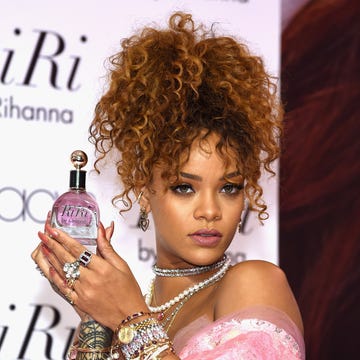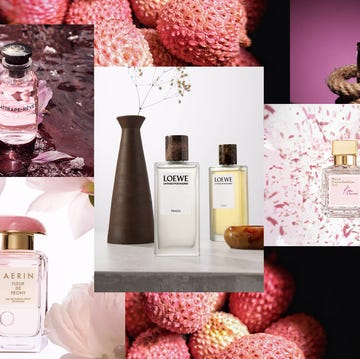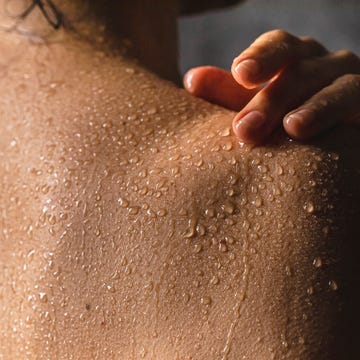“I love your teeth!” Charlotte Le Bon’s Chloe tells Aimee Lou Wood’s Chelsea in the newest season of The White Lotus. “You're from England, right?”
At that moment, Chelsea broadly grins and Chloe returns the gesture—revealing her own unique smile—cementing the two women’s friendship. But the compliment and bonding moment goes far beyond a generalized plot point on the show.
Speaking about the widespread discourse around her naturally prominent smile, Wood said during an appearance on The Jonathan Ross Show: “I can’t believe the impact my teeth are having. Americans can’t get over them.”
Of course, the British having perfectly imperfect smiles is nothing new, with the UK often relegated to a punchline thanks to our history of having functional, practical, but not necessarily attractive teeth. Austin Powers and his distinctive gnashers were wildly over-exaggerated for comic effect to emphasize the snorting English stereotype; meanwhile, a visual gag on The Simpsons refers to "The Book of British Smiles", showcasing the best (or worst?) crooked teeth.
Having grown up with a set of teeth that looked as if they’d been chewed up and spat out by someone else, I know what it’s like to feel a creeping sense of shame every time you dare to smile. Having teeth that were not dainty, even, or neat only enhanced my inherent shyness, scared to even speak in case casually cruel observers felt like ruining my day.
However, things have changed since my awkward adolescence, with unwanted wonky fangs now able to be a thing of the past. The indignity of wearing train-track wires in order to correct your teeth is also from a bygone era, with Invisalign becoming more affordable and more widely available. Elsewhere, it is thought that up to to 200,000 Brits fly to Turkey every year for cosmetic dental procedures, leading to ‘Turkey teeth’ entering the British lexicon due to the popularity of large, gleaming-white veneers. No longer a status symbol or a dirty secret—veneers have been democratized to the point that the work of Hollywood starlets can now be afforded by laypeople.
But the perfect smile seems to have lost its blinding white shine in more recent months, with those seeking dental work no longer wanting a look that is quite so perfect.
“Role models such as The White Lotus' Aimee Lou Wood are reshaping beauty standards by heralding an age of authenticity and uniqueness in beauty, rather than encouraging a total alteration of facial features,” Deepa Chopra, principal dentist of the leading London practice Whites Dental, tells Bazaar. “As the world continues to learn how to accept the differences in others, more people are focusing on enhancing their unique features than ever before.
“Gone are the days of the uniform ultra-white, straight ‘Hollywood’ smiles. This is particularly noticeable in the luxury market as influencers and celebrities have been finding ways to subtly enhance their features to maintain their individuality on their own terms.”
Thomas Crawford Clark, founder of the Marylebone-based cosmetic dental clinic Luceo, agrees. “The majority of patients that we see are interested in achieving a really natural result and finding the ‘imperfectly perfect’ look is what we are now aiming for,” he explains. “Patients are wanting to keep their own smiles but just an improved version. It's ‘you, but better’.”
While, of course, there's nothing wrong with veneers (although those who seek cheaper options may find their teeth botched for the long term), their widespread use may have led to us lamenting the days when smiles were unique. Dental treatments are a relatively new practice (cosmetic orthodontists only came about in the late 1920s, less than 100 years ago) and, while they were popularised in America, dentistry on the NHS in the UK favored practical functionality, leaving our teeth less uniform on the whole.
Even as cosmetic dentistry became more mainstream in the UK, not all the upper echelons acquiesced to have their smiles altered. The royals, for example, have never succumbed to the call of Invisalign (that we know of) while other Brits in the showbiz sphere stood by their natural teeth. Kate Moss’ imperfect smile did not prove to be a barrier to her becoming the pioneering supermodel of the nineties, while Georgia May Jagger’s gap-toothed grin was heralded as ‘the London look’ when she was the face of Rimmel in the early noughties. Elsewhere, Keira Knightley celebrated her “wonky teeth” in an interview with CBS a few years ago, saying she was stunned that no one actually asked her to straighten her pearly whites to be more in keeping with the Hollywood ideal—but these examples are few and far between, particularly in the Instagram era of filtered perfection.
It's refreshing, then, to see Wood’s natural twinkling grin on screen. Uniformity may be preferred on social media, but individuality is vital for actors to actually show character. Too-perfect veneers can wipe away this uniqueness, making performers look bland, generic, and out of place (watching a period drama with street urchins having an incredible white smile pulls anyone out of the verisimilitude of the story).
It may be why now, with people leaning more towards authenticity rather than perfection, oral-based beauty trends are seeing consumers wanting their unique features highlighted rather than erased.
“There has been a definite increase in people looking to enhance, rather than standardize, their smiles,” Chopra says. “Treatments such as enamel contouring, micro-bonding, and naturally shaded veneers are starting to overtake requests for the more traditional, early 2010s straight-tooth transformations that we have all come to expect when we hear the word ‘veneers’.”
Crawford Clark has designed his practice specifically to cater to this demand for natural-looking results. “We design every smile unique to each patient, so no two smiles are the same, with subtle nuances,” he explains. “I like to choose one tooth from my patient as a reference and build the new smile around that. This helps maintain that sense of individuality and personality, and the feeling that our patients still have their own smile – just the best version.” Advances in technology have also allowed for more bespoke approaches to treatment plans. “We can use facially driven digital designs to show patients how their new smiles could look, using the latest technology from iTero and 3D digital scanning,” Crawford Clark says. “This allows us to show a prediction of your new smile in a moving video of your own face talking, laughing, and smiling.”
While it's undeniably refreshing to see a move away from impossibly faultless smiles, it's clear that dental work is still in demand; nearly half of the UK population (48 percent) plan to undergo cosmetic dental work in the future, and it is no exaggeration to say that Invisalign actually changed my life. However, if big-name and beautiful actresses like Wood are pioneering the dental charge to give people the much-needed faith to stand by their natural smiles, this can only be a positive thing.
“Our smile is often the first thing people see of you, so when there is an issue in this area it’s natural for this to have an impact on a person’s overall confidence,” Chopra says.
“With social media and professional branding more important than ever before, having a smile you're happy with is no longer purely an act of vanity – but opening a gateway to self-assurance in all aspects of life.”


















